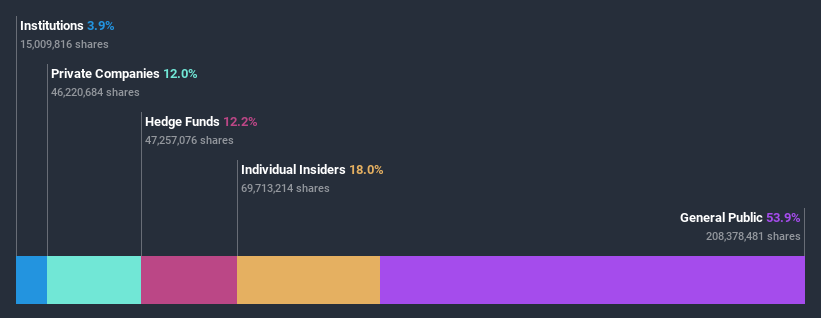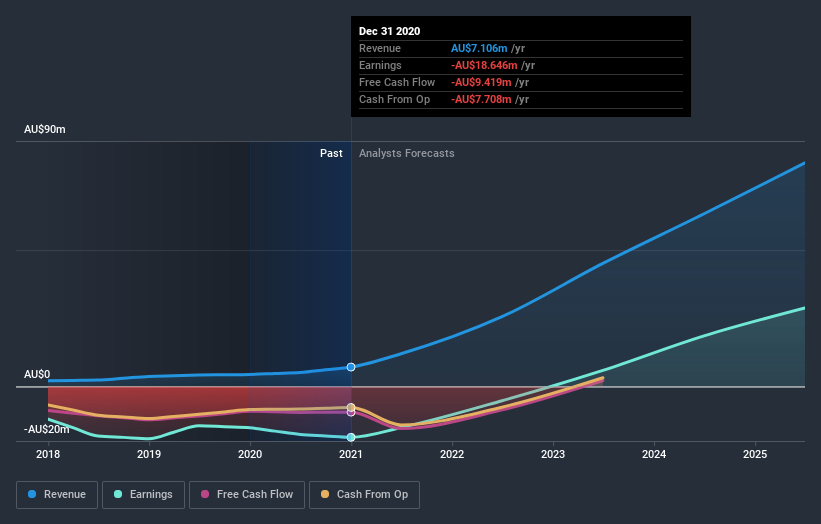What Kind Of Shareholders Hold The Majority In Family Zone Cyber Safety Limited's (ASX:FZO) Shares?
If you want to know who really controls Family Zone Cyber Safety Limited (ASX:FZO), then you'll have to look at the makeup of its share registry. Institutions often own shares in more established companies, while it's not unusual to see insiders own a fair bit of smaller companies. Warren Buffett said that he likes "a business with enduring competitive advantages that is run by able and owner-oriented people." So it's nice to see some insider ownership, because it may suggest that management is owner-oriented.
Family Zone Cyber Safety is a smaller company with a market capitalization of AU$193m, so it may still be flying under the radar of many institutional investors. In the chart below, we can see that institutions don't own many shares in the company. We can zoom in on the different ownership groups, to learn more about Family Zone Cyber Safety.
Check out our latest analysis for Family Zone Cyber Safety
What Does The Institutional Ownership Tell Us About Family Zone Cyber Safety?
Institutional investors commonly compare their own returns to the returns of a commonly followed index. So they generally do consider buying larger companies that are included in the relevant benchmark index.
Since institutions own only a small portion of Family Zone Cyber Safety, many may not have spent much time considering the stock. But it's clear that some have; and they liked it enough to buy in. If the company is growing earnings, that may indicate that it is just beginning to catch the attention of these deep-pocketed investors. We sometimes see a rising share price when a few big institutions want to buy a certain stock at the same time. The history of earnings and revenue, which you can see below, could be helpful in considering if more institutional investors will want the stock. Of course, there are plenty of other factors to consider, too.
Our data indicates that hedge funds own 12% of Family Zone Cyber Safety. That's interesting, because hedge funds can be quite active and activist. Many look for medium term catalysts that will drive the share price higher. Regal Funds Management Pty Limited is currently the largest shareholder, with 12% of shares outstanding. Meanwhile, the second and third largest shareholders, hold 6.5% and 2.8%, of the shares outstanding, respectively. Timothy Levy, who is the third-largest shareholder, also happens to hold the title of Member of the Board of Directors.
On studying our ownership data, we found that 24 of the top shareholders collectively own less than 50% of the share register, implying that no single individual has a majority interest.
While it makes sense to study institutional ownership data for a company, it also makes sense to study analyst sentiments to know which way the wind is blowing. There is a little analyst coverage of the stock, but not much. So there is room for it to gain more coverage.
Insider Ownership Of Family Zone Cyber Safety
The definition of company insiders can be subjective and does vary between jurisdictions. Our data reflects individual insiders, capturing board members at the very least. Management ultimately answers to the board. However, it is not uncommon for managers to be executive board members, especially if they are a founder or the CEO.
Most consider insider ownership a positive because it can indicate the board is well aligned with other shareholders. However, on some occasions too much power is concentrated within this group.
Our most recent data indicates that insiders own a reasonable proportion of Family Zone Cyber Safety Limited. Insiders have a AU$35m stake in this AU$193m business. It is great to see insiders so invested in the business. It might be worth checking if those insiders have been buying recently.
General Public Ownership
The general public holds a substantial 54% stake in Family Zone Cyber Safety, suggesting it is a fairly popular stock. This size of ownership gives investors from the general public some collective power. They can and probably do influence decisions on executive compensation, dividend policies and proposed business acquisitions.
Private Company Ownership
We can see that Private Companies own 12%, of the shares on issue. Private companies may be related parties. Sometimes insiders have an interest in a public company through a holding in a private company, rather than in their own capacity as an individual. While it's hard to draw any broad stroke conclusions, it is worth noting as an area for further research.
Next Steps:
I find it very interesting to look at who exactly owns a company. But to truly gain insight, we need to consider other information, too. Consider risks, for instance. Every company has them, and we've spotted 1 warning sign for Family Zone Cyber Safety you should know about.
If you would prefer discover what analysts are predicting in terms of future growth, do not miss this free report on analyst forecasts.
NB: Figures in this article are calculated using data from the last twelve months, which refer to the 12-month period ending on the last date of the month the financial statement is dated. This may not be consistent with full year annual report figures.
This article by Simply Wall St is general in nature. It does not constitute a recommendation to buy or sell any stock, and does not take account of your objectives, or your financial situation. We aim to bring you long-term focused analysis driven by fundamental data. Note that our analysis may not factor in the latest price-sensitive company announcements or qualitative material. Simply Wall St has no position in any stocks mentioned.
Have feedback on this article? Concerned about the content? Get in touch with us directly. Alternatively, email editorial-team (at) simplywallst.com.



